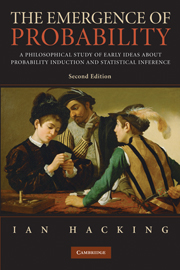 The Emergence of Probability
The Emergence of Probability Book contents
- Frontmatter
- Contents
- Introduction 2006
- 1 An absent family of ideas
- 2 Duality
- 3 Opinion
- 4 Evidence
- 5 Signs
- 6 The first calculations
- 7 The Roannez circle (1654)
- 8 The great decision (1658?)
- 9 The art of thinking (1662)
- 10 Probability and the law (1665)
- 11 Expectation (1657)
- 12 Political arithmetic (1662)
- 13 Annuities (1671)
- 14 Equipossibility (1678)
- 15 Inductive logic
- 16 The art of conjecturing (1692[?] published 1713)
- 17 The first limit theorem
- 18 Design
- 19 Induction (1737)
- Bibliography
- Index
- Frontmatter
- Contents
- Introduction 2006
- 1 An absent family of ideas
- 2 Duality
- 3 Opinion
- 4 Evidence
- 5 Signs
- 6 The first calculations
- 7 The Roannez circle (1654)
- 8 The great decision (1658?)
- 9 The art of thinking (1662)
- 10 Probability and the law (1665)
- 11 Expectation (1657)
- 12 Political arithmetic (1662)
- 13 Annuities (1671)
- 14 Equipossibility (1678)
- 15 Inductive logic
- 16 The art of conjecturing (1692[?] published 1713)
- 17 The first limit theorem
- 18 Design
- 19 Induction (1737)
- Bibliography
- Index
Summary
According to legend probability began in 1654 when Pascal solved two problems and then wrote to Fermat. In fine detail this is wrong. The problems had been around for a long time and Pascal's chief clue to solution – the arithmetic triangle – is something Pascal might have learned at school and which was given in lectures even a century earlier. But like so many persisting legends the story of 1654 encapsulates the truth. The decade around 1660 is the birth time of probability.
In 1657 Huygens wrote the first probability textbook to be published. At about that time Pascal made the first application of probabilistic reasoning to problems other than games of chance, and thereby invented decision theory. His famous wager about the existence of God was not printed until 1670 but it was summarized in 1662 at the end of the Port Royal Logic. The same book was the first to mention numerical measurements of something actually called ‘probability’. Simultaneously but independently the adolescent German law student Leibniz thought of applying metrical probabilities to legal problems. He was also engaged in writing a first monograph on the theory of combinations. Also in the late 1660s annuities (long used by Dutch towns for financing public business) were being put on a sound actuarial footing by John Hudde and John de Witt. The London merchant John Graunt published in 1662 the first extensive set of statistical inferences drawn from mortality records.
Information
- Type
- Chapter
- Information
- The Emergence of ProbabilityA Philosophical Study of Early Ideas about Probability, Induction and Statistical Inference, pp. 11 - 17Publisher: Cambridge University PressPrint publication year: 2006
Accessibility standard: Unknown
Why this information is here
This section outlines the accessibility features of this content - including support for screen readers, full keyboard navigation and high-contrast display options. This may not be relevant for you.Accessibility Information
- 3
- Cited by